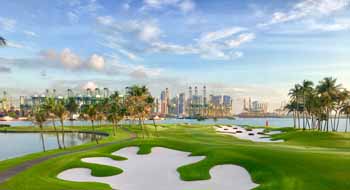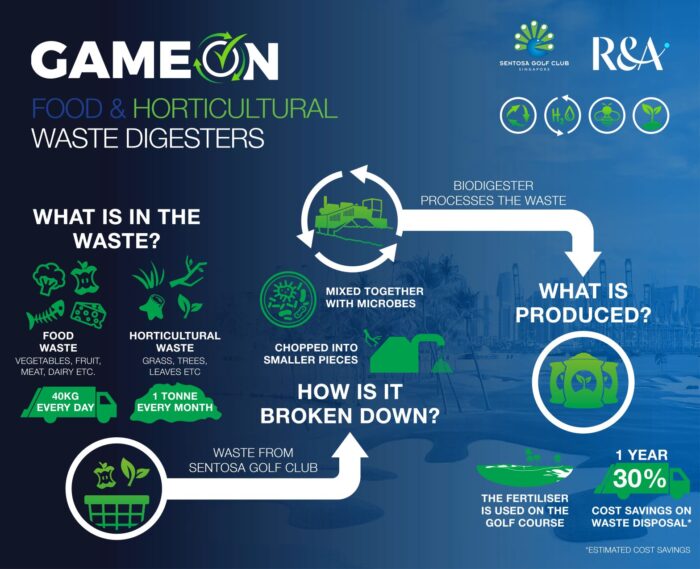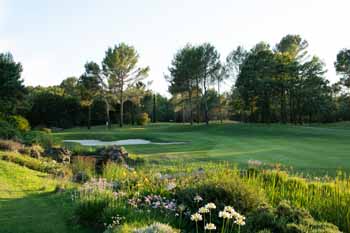From your fork to the tee
From a golf club in Singapore that uses food waste from the restaurant as fertiliser on the course to a French venue that has replaced the grass on its course to a species that requires less water, The Golf Business looks at some remarkable environmental projects that have been taking place at golf clubs around the world.
Golf clubs around the world have been leading the way in recent months in showing how environmentally friends the industry can be.
Sentosa Golf Club in Singapore, for example, is installing two digesters that will make it the first club in Asia with the ability to grind down food and horticultural waste to reuse as fertiliser on the golf course.
Using a Golf Sustainability Fund Grant awarded by The R&A, the club, set on Sentosa Island, will reuse 40kg of food waste generated each day along with the one tonne of horticultural waste produced every month.
The grant is part of a project that will also help bring sustainable organic waste management practices to golf courses in Asia with Sentosa Golf Club estimating cost savings of up to 30 percent on monthly waste disposal over a one-year period.

Sentosa
It also comes shortly after Sentosa Golf Club was announced as the world’s first golf club to sign the UN’s Sports for Climate Action Initiative.
Embarking on a two-stage process, the first will see Sentosa using a food waste bio-digester to process and grind down waste from its three food and beverage outlets on site. Once microbes are added to the waste it is ready for use as organic fertiliser on the golf courses, SMBC Singapore Open venue, The Serapong, and The New Tanjong, which hosts the HSBC Women’s World Championship and was also the chosen venue for the 10th edition of the Asia-Pacific Amateur Championship (AAC) and the inaugural Women’s Amateur Asia-Pacific (WAAP) in 2018.
The second stage of the project will introduce a heavy duty woodchipper and bio-digester shredder to grind an estimated one tonne of horticulture waste that is generated each month at the club. The club does not currently purchase and apply compost material on the golf course, but foresees that a suitable compost by-product can be derived from this project and used to improve the golf course, including the retention of vital moisture across the fairways, thereby reducing the need for irrigation.
Andrew Johnston, director of agronomy and general manager at Sentosa Golf Club, said: “It is very humbling for Sentosa Golf Club to be chosen by The R&A to be part of its Golf Sustainability Fund. Personally, I’m very proud of what the club has achieved in recent years with its environmental efforts. The entire team at the club can be recognised for their hard work and dedication towards creating an environmentally sustainable environment – it has become a way of life at the club.
“This grant will help us go a long way towards further achieving our goals and the waste recycling project along with all the other initiatives we have implemented here at the club, will hopefully inspire other clubs around the world to play their part in becoming more sustainable.”

On the importance of such an initiative, Johnston added: “Most horticultural and golf course waste is currently disposed through the process of waste incineration or burial administered by the local authorities. This adds to air pollution and applies pressure to landfill sites, which is particularly pertinent to land-starved Singapore.”
Both The R&A and leadership team at Sentosa Golf Club envision achieving a major leap in golf course specific waste recycling and fertiliser use across the fairways of courses all over the world along with a major change in the consideration of how golf clubs approach their waste management strategies. The club’s initiative will also help with the research and development of bi-product fertilisers that can be used on primary roughs and fairways and shared with other golf clubs in Asia and around the world.
Dominic Wall, director – Asia-Pacific at the R&A, said: “Sentosa Golf Club has introduced many environmental-friendly golf course practices over the last few years and The R&A is excited to work with them on this project, not only to allow them to further a more sustainable environment at the club, but also to provide the vital research needed for other clubs in Asia and around the world to use as best practice.”
Chris Gray, head of sustainability and agronomy – Asia-Pacific at The R&A, added: “The R&A is extremely pleased to be able to work closely with Sentosa Golf Club through our sustainability fund and help them continue to raise the bar and act as a model for other golf clubs around the world to follow in terms of environmental sustainability.”
Sentosa Golf Club’s green agenda was initially brought to the attention of the golfing world with the launch of its #KeepItGreen campaign at the SMBC Singapore Open in January 2018. It saw a number of key environmental features implemented at the club, such as the creation of its own bee colonies; using rechargeable lithium batteries in their golf carts; banning single use plastics from the golf course and replacing them with water stations; as well as installing electric vehicle charging sockets and building their own sustainable herb garden.
The club also unveiled a new global campaign, GAME ON, at the start of the year, which is designed to unite the global golf community in addressing the growing concerns of climate change. The aim is to educate and inspire the global golfing community, helping golf clubs around the world to better prepare by introducing modern sustainability practices to reduce their environmental impact.
The campaign is closely aligned with The R&A’s 2030 Golf Course Initiative that considers the impacts, both positive and negative, of the changing climate, resource constraints and regulation on course condition and playability. The R&A has also recently pledged their support of the GAME ON initiative.
Meanwhile, Terre Blanche in Provence is taking steps to reduce light pollution.

Terre Blanche
A European Tour destination and one of only seven golf resorts in France to be GEO certified, as part of its leading sustainable development plan, Terre Blanche has taken drastic measures to reduce light pollution across its two 18-hole championship golf courses, Le Château and Le Riou. Reducing light pollution restores biodiversity by preserving dark habitat for fireflies, bats, birds, turtles and other nocturnal animals.
The club is retrofitting all outdoor path lighting from sodium lamps to use LED bulbs with an oriented flux. These bulbs consume 55 percent less energy and reduce light pollution by illuminating in a specific direction, rather than diffusing light indiscriminately into the whole of their surroundings. To further protect nature, each lamp has also been fitted with blackout screens on three of its four sides to ensure light is only emitted into the pathway, and not outwards into the forest or night sky.
Elsewhere, flora conversion has taken place to save water and the reduction of phytosanitary products. The club has replaced all the grass on its two 18-hole championship golf courses – changing the type of grass to Bermuda Grass Riviera, a different species that consumes less water.
Plus it has switched to an electric golf cart fleet – all Terre Blanche golf carts are electric, reducing air pollution, consumption of fossil fuels and allowing guests of the hotel and golf courses to travel in low levels of noise without disrupting the surrounding wildlife, and the club has set up an undergrowth clearing team made up of five donkeys that are selective and leave the existing biotope and fauna untouched and undisturbed.















Let me tell You a sad story ! There are no comments yet, but You can be first one to comment this article.
Write a comment